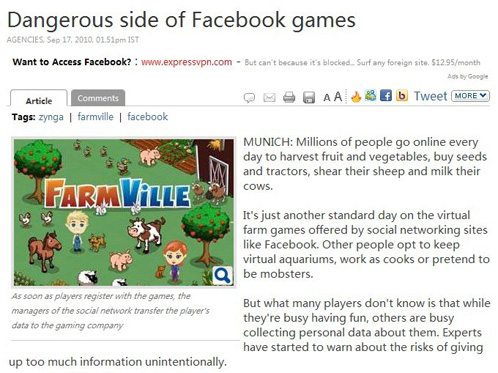印度时报消息:社交游戏匿隐患 玩家隐私无保障
每天都有数以万计的人群挂在Facebook上的虚拟农场享受买种、收割、挤奶的农家乐,或是在游戏中演绎厨神、江湖大佬等角色,很是过瘾地当了一回风云人物。正当这些玩家在虚拟世界中神游的时候,另一拔人也没闲着,他们正马不停蹄地收集玩家的个人数据,不少专家提醒,毫无戒心的玩家已经在无意间泄露了太多个人信息。
社交游戏免费体验的特点,加上聊天和交流功能,使越来越多的社交网站人气暴增。据了解,仅Zynga一家公司每月就可轻松虏获2.3亿的《Mafia Wars》、《Poker》或《Farmville》的游戏粉丝。
游戏产业利润丰厚,据德国一家咨询公司Sturm & amp调查发现,仅凭社交游戏一项,游戏产业每年就可卷走6.8亿至13亿欧元(约8.72亿至16.7亿美元)。这些营收从何而来?虽然这些游戏名义上是免费,但修炼到一定功力的骨灰级玩家若想晋级,就必然要额外支付一些钱,购买道具或者买通其他关节。
柏林一家社交游戏公司Wooga的执行总监Jens Begemann表示,“付费玩家其实还不到5%,而且每个玩家花钱也不多,但因为庞大的玩家基数,每笔交易相加后就成了一个巨额数字。”
事实上,即是玩家完全免费玩游戏,社交游戏公司也并非一无所得。玩家在社交网站注册登记时,通常需要提交电子邮箱、出生日期、好友信息、家庭住址等私人信息,这些用户数据都将通过网站管理员转发给游戏公司。这些信息的内容范围往往因社交网站和游戏供应商的注册要求而有所不同,Facebook通常要求玩家提供所有可公开的个人信息,而这种要求在一些国家是默认合法的。
主要研究网络法的德国律师Carsten Ulbricht表示,“如果用户同意了注册条款中关于个人信息的内容,那就表示用户默认这些信息也可以为其他人所共享。”用户如果将个人信息设置成公开状态,就意味着通过谷歌就有可能搜索到该用户资料,游戏公司要获得这些信息更是易如反掌。Ulbricht还提醒,像Facebook这类美国公司并没有制定明确的个人信息保护条例。
Wooga公司的Begemann则对此事不以为然,认为“你在跟朋友玩游戏的时候,只要不发送名字和照片,没有人可以把你的名字和长相对上号,也就不会知道自己到底在跟谁玩游戏。”
实际上,这些私人数据还可能被个性化广告盗用。但Begemann对此表示,“除非是为了服务玩家,我们才会使用这些数据,但我不知道其他公司会怎么操作。几乎所有的大型游戏供应商都通过出售虚拟商品提高游戏营收……”
德国石荷州独立数据保护中心的专家Henry Krasemann建议用户,如果想保护好个人信息,最好事先查阅一下信息保护条款内容,向有关方面咨询私人数据是否会被泄露,如果游戏开发商要求用户提交的信息很少,那是再好不过了。
律师Ulbricht认为,还有一种选择,那就是取消注册实名制,用户登记时全部使用网名,尽管此举可能与网站管理有所冲突,“大不了就是让自己的游戏帐号被注销”,这也意味着玩家倾注无数心血经营的虚拟农场将一夜蒸发,但至少可以保证玩家的信息安全。
Dangerous side of Facebook games
MUNICH: Millions of people go online every day to harvest fruit and vegetables, buy seeds and tractors, shear their sheep and milk their cows.
It’s just another standard day on the virtual farm games offered by social networking sites like Facebook. Other people opt to keep virtual aquariums, work as cooks or pretend to be mobsters.
But what many players don’t know is that while they’re busy having fun, others are busy collecting personal data about them. Experts have started to warn about the risks of giving up too much information unintentionally.
Social games are free and don’t need to be installed on a computer, since they can be played via a browser. Since the games rely on communication and interaction between players, social networks are an ideal platform for them.
Thanks to those networks, the games have spread rapidly in very little time. Industry leader Zynga reports that it alone draws about 230 million players a month to play Mafia Wars, Poker or Farmville.
The gaming industry sees a lucrative market. A study by the German consulting company of Muecke, Sturm & Company found that companies in this industry earn between 680 million and 1.3 billion euros (872 million and 1.67 billion dollars) a year with social games.
But how do they earn that money? Microtransactions are the key. Although the games are free, anyone who wants to get a leg up, have a little extra play money or own especially useful goods can do so by paying out some real money.
“Less than 5 per cent of the players use this opportunity and the individual sales are small. But, with millions of players, that quickly adds up to a lot,” says Jens Begemann, director of Wooga, a social gaming company based in Berlin.
Data is the second kind of currency in the world of social gaming. As soon as players register with the games, the managers of the social network transfer the player’s data to the gaming company.
The kind of information depends on the network and the supplier. Facebook regularly supplies all publicly available information.
Anyone who wants to play with Facebook might also have to accept that their email address, date of birth, list of friends and hometown might be forwarded to the game company. This is allowed in some countries as soon as permission is given.
“If the user has had the terms explained and approved the use of his data, then they can be shared,” says Carsten Ulbricht, a German attorney specialising in internet law.
Profile data that the user has set as public, which means it can also be found in a Google search, can then be offered to the game companies. American companies like Facebook tend to have less transparent data protection guidelines, Ulbricht says.
Begemann sees no way around some data being saved for social games. “You want to play with your friends. If names and pictures aren’t transferred, then no one knows with whom they’re playing,” he noted.
But the personal data can also be used for personalised advertising. “We only use the data for our players. I can’t say what happens with other companies. But all large providers have monetized their virtual goods,” Begemann says.
Anyone who wants to protect their information should read the data protection clauses and ask whether the requested data can be divulged, advises Henry Krasemann, of the independent data protection centre of the German state of Schleswig-Holstein. It’s a good sign when a provider only asks for the minimum level of data.
“One should only provide as much as is necessary,” he says. It’s hard to do too much with individual pieces of data, but put together they can create a profile that could be useful for advertising interests.
Ulbricht says one alternative is to register under a pseudonym, even if that does conflict with the operating procedures of some websites.
“The worst that can happen is that the account gets erased,” he says. That would mean the loss of a virtual farm and all the work involved in creating it, but one’s data would remain private.(source:timesofindia)
声明:本文中文为游戏邦翻译,英文原文采用timesofindia,转载请保留版权信息,谢谢!








































 闽公网安备35020302001549号
闽公网安备35020302001549号